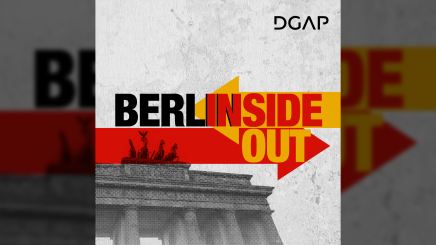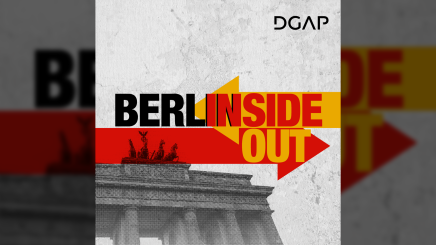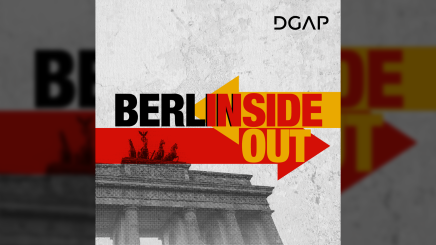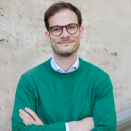Helping Germany Develop Both Its Willingness and Capacity to Act Effectively
Germany’s readiness to adapt to a new and more hostile world – expressed in Chancellor Olaf Scholz’s speech announcing the so-called Zeitenwende on February 27, 2022 – opened a window of opportunity for the kind of holistic and lasting transformation that will benefit both the country and its partners. The speech also marked a frank recognition that Germany’s lack of political will has been an obstacle to reform for decades and, too often, an excuse for inaction.
This ambitious project, which concluded in the summer of 2024, brought together leading figures and rising stars of German and international politics and policy to support a generational and perspectival shift in thinking and action. It provided this group of change-makers with a network and access to the analytical and practical tools necessary to better imagine, articulate, and implement the transformation that Germany so urgently needs.
While defense is the aspect of the Zeitenwende with the highest profile, the need for reform is far greater. It extends across the spectrum of Germany’s economy, trade, technology, energy, climate, society, and foreign policy. Thus, this DGAP project provided a forum for integrated policy thinking to drive effective action on capacities, institutions, partnerships, attitudes, and posture.
The Zeitenwende also needs to be internationalized if it is to be successful. Although Germany cannot act effectively on its own, it can no longer submerge its interests in European or international institutions or hide behind its partners. Therefore, this project took full account of Germany’s international alliances and partnerships and drew in perspectives from across Europe and around the world.
The Action Group Zeitenwende – as the earlier project “Ideenwerkstatt Deutsche Außenpolitik” – cultivated the comprehensive yet coherent approach that Germany needs to better define, express, and pursue its own interests as well as the goals and values it shares with its partners. It helped build a Germany that is ready, willing, and able to act.
The project "Action Group Zeitenwende" was funded by Stiftung Mercator.
Members of the Action Group Zeitenwende
This list includes all individuals who were involved over the course of the project. Please note that some participants did not take part for the full duration, and not all members necessarily share or endorse all the conclusions.
- Co-Chairs
-
- Nanni, Sara - MdB B90/die Grünen, Defence Spokesperson for Green Parliamentary Group
- Wolff, Guntram - Senior Fellow, Bruegel & former Director, DGAP
- Tallis, Benjamin - Former Project Manager, AGZ and Senior Research Fellow, DGAP
- Participants
-
- Abraham, Knut - MdB CDU, Chair of Bundestag Human Rights and Humanitarian Assistance Committee
- Alberque, William - Non-Resident Fellow, The Stimson Center, Converging Technologies and Global Security Program, former Director Security, Strategy & Technology, IISS Berlin
- Arlt, Johannes - MdB SPD, Bundestag Economics and Defence Committees
- Bolten-Drutschmann, Annika - Deputy Head of Policy Planning, Federal Foreign Office, Berlin
- Bentele, Hildegard - MEP, CDU-EPP, Rapporteur EU Strategy Critical Raw Materials
- Barkin, Noah - Senior Advisor, Chinese Practice, Rhodium Group, Berlin
- Campbell, Loyle - Research Fellow, Centre for Climate and Foreign Policy, DGAP Berlin
- Dahns, Friederike - Head of Sub-Division, "Steuerung OZG und Digitalisierungsvorhaben", Federal Ministry of Interior and Community; Chair NATO Civil Protection Group, Berlin
- Davies, Franziska - Researcher, Institute for East & Southeast European History, Ludwig-Maximilian University, Munich
- Erndl, Thomas - MdB CDU/CSU, Deputy Chair of Bundestag Foreign Affairs Committee
- Faber, Marcus - MdB FDP, Chair of Bundestag Defence Committee
- Freist-Held, Jonas - Chief of Staff to SPD Party Leader Lars Klingbeil, MdB
- Ganter, Julia - Programme Director, International Affairs, Körber Stiftung
- Gasch Burnett, Aaron - Security Policy Fellow, European Resilience Initiative Center, Berlin
- Glogowski-Merten, Anikó - MdB FDP, Bundestag Foreign Affairs and Climate & Energy Committees
- Gressel, Gustav - Senior Policy Fellow, Defence & Wider Europe Programme, ECFR Berlin
- Hagebölling, David - Associate Fellow, Centre for Geopolitics, Geoeconomics & Technology, DGAP, Berlin
- Huotari, Mikko - Executive Director, MERICS, Berlin
- Hofreiter, Anton - MdB B90/die Grünen, Chair of Bundestag European Affairs Committee
- Kiesewetter, Roderich - MdB CDU, Crisis Prevention Spokesperson for CDU Parliamentary Group, Bundestag Intelligence Oversight and Foreign Affairs Committees
- Kleinhans, Jan-Peter - Project Director "Technology and Geopolitics", Stiftung Neue Verantwortung, Berlin
- Lange, Nico - Senior Fellow, Zeitenwende Initiative, Munich Security Conference, Berlin [tbc]
- Matlé, Aylin - Research Fellow, Center for Security and Defense, DGAP, Berlin
- Minier, Jiro - Lead, Threat Intelligence Research & Analysis, Deutsche Cyber Sicherheitsorganisation, Berlin
- Olsen, Kim - Sanctions Advisor to Federal Foreign Office, GIZ Stabilization Platform, and Associate Fellow, DGAP Berlin
- Parkes, Roderick - Researcher, NATO Defence College, Rome. Former Deputy Director, DGAP
- Ringhof, Julian - Policy Fellow, ECFR, Berlin
- Roepert, Jan Willem - Lieutenant Colonel, Federal Ministry of Defence (BMVg), Berlin
- Rühlig, Tim - Senior Research Fellow, Centre for Geopolitics, Geoeconomics & Technology, DGAP, Berlin
- Rüland, Anchalee - Policy Advisor for International Affairs to Norbert Röttgen MdB, CDU, Berlin
- Rusyn, Stepan - Coordinator, German-Ukrainian Partnership Program, Transatlantic Dialogue Center, Berlin
- Schäfer, Sebastian - MdB, B90/die Grünen, Deputy Chair of Bundestag Bundeswehr Special Fund Committee
- Schäfer, Jamila - MdB B90/die Grünen, Bundestag Foreign Affairs & Budget Committees
- Schimmel, Florence - Research Fellow, Center for Security and Defence, DGAP, Berlin
- Speck, Ulrich - Geopolitical Columnist, Neue Zürcher Zeitung (NZZ), Heidelberg
- Stamm, Leonie - Research Fellow, AOZ Center for the Future of Europe, DGAP, Berlin
- Vaut, Simon - Director, Economic Stability and Energy Security, Federal Ministry of Economic Affairs and Climate Protection, Berlin
- Von Cramon, Viola - MEP B90/Die Grünen, Greens/EFA, Brussels
- Winter, Wiebke - Member of the Board, CDU Bremen and Founder, Klima Union (CDU)
- Woll, Cornelia - President, Hertie School, Berlin
- International Sounding Board
-
- Ålander, Minna - Research Fellow, FIIA, Helsinki
- Berti Alberti, Bendetta - Head of Policy Planning, NATO, Brussels
- Eichhorn, Jan - Associate Professor of Sociology, University of Edinburgh and Director, d|part, Berlin
- Fägersten, Björn - Senior Research Fellow, Swedish Institute of International Affairs
- Galeotti, Mark - Director, Mayak Consulting, Honorary Fellow RUSI, Honorary Professor UCL, London
- Garcia-Herrero, Alicia - Senior Fellow, Bruegel, Brussels
- Gotkowska, Justyna - Deputy Director, OSW, Warsaw
- Hodges, Ben - Lieutenant General (ret.), Former Commanding General, United States Army Europe, Frankfurt
- Klimkin, Pavlo - Former Minister of Foreign Affairs of Ukraine, Kyiv
- Melvin, Neil - Director International Security Studies, RUSI, London
- Michta, Andrew - Director, Scowcroft Strategy Initiative and Senior Fellow, Scowcroft Center for Strategy and Security, Atlantic Council, Washington D.C.
- Moll, Ben - Professor of Economics, London School of Economics, London
- Quencez, Martin - Managing Director, Geostrategy & Risk, and Director, Paris Office, GMF, Paris
- Raik, Kristi - Director, Estonian Foreign Policy Institute and Deputy Director, ICDS, Tallinn
- Ritschl, Albrecht - Professor of Economic History, London School of Economics, London
- Šedivy, Jiři - Chief Executive, European Defence Agency, Brussels
- Spöri, Tobias - Research Fellow, d|part, Vienna
- Stringer, Edward - Air Marshal (ret.), Former Deputy Chief of the UK Defence Staff, London
- Van de Perre, Liesbet - Professor, Faculty of Engineering Technology, KU Leuven
- Vedral, Bobby - Partner, Toscafund Asset Management LLP, London
- Von Hippel, Karin - Director General, RUSI, London
- Wieslander, Anna - Director for Northern Europe, Atlantic Council, Lund
- Business Sounding Board
-
- Bösenberg, Frank - Managing Director, Silicon Saxony
- Hoffmann, Christian - Head of Geopolitics & International Relations, Siemens AG, Berlin
- Jacob, Britta - Senior Manager, Global Governmental Affairs, Bayer, Berlin
- Leibing, Martin - Associate Director Germany, Corporate Affairs, Merck, Berlin
- Marx, Stefan - Head of Public Affairs & Regulatory Strategy, DWS Group
- Rietig, Lukas Andreas - Assistant Vice President, Deutsche Bank AG, Berlin
- Schnaubelt, Jean-Pierre - Senior Expert Public Affairs, Group Regulatory and Public Affairs, Allianz
- Vogelbach, Melanie - Head of International Economic Policy & Law, DIHK, Berlin [tbc]
- Wachter, Matthias - Managing Director, NewSpace Initiative; Head of International Cooperation, Security Policy, Raw Materials, BDI Berlin
- Project Team
-
- Tallis, Benjamin - Project Manager, AGZ and Senior Research Fellow, DGAP
- Stöckle, Julian - Project Assistant, DGAP
- Hartmann, Jannik - Project Assistant, DGAP
- Parkes, Roderick - Researcher, Former Deputy Director, DGAP
- Funding Foundation – Stiftung Mercator
-
- Hecht, Jennifer - Project Manager, Europe in the World Programme, Stiftung Mercator
- Kirchner, Magdalena - Director, Europe in the World Programme, Stiftung Mercator
- Wieland Karimi, Almut - Board Member, Stiftung Mercator
- Grotewold, Lars - Interim Director, Europe in the World Programme, Stiftung Mercator
Share
Publications
China “De-risking”
Who’s Afraid of (Ukraine’s) Victory?
For Germany’s chancellor, victory seems to be the hardest word. This reluctance appears driven by fears of geopolitical change, which he seems hesitant to shape, let alone master, and by drawing the wrong lessons from German history.
The Zeitenwende Is Here, It’s Just Unevenly Distributed
At first it meant a “historical shift” that happened to Germany, now the term "Zeitenwende" is widely used to describe the country’s much-needed foreign and security policy rethink. Much has changed already, but important questions remain open.
What Zeitenwende?
Instead of introvertedly focusing on defense, internationalizing and socializing their country’s transformation will give Germans the best options for action—and drive lasting change, which they must own.
Building European Resilience and Capacity to Act
Media Center

Germany’s Failing Zeitenwende – And What to Do About It

MunichsideOut Live From the PSC: Neo-Idealism – Winning the Systemic Competition Starts in Ukraine (Part 2)

MunichsideOut: The Munich Security Conference and Germany’s Foreign Policy Agenda (Part 1)









